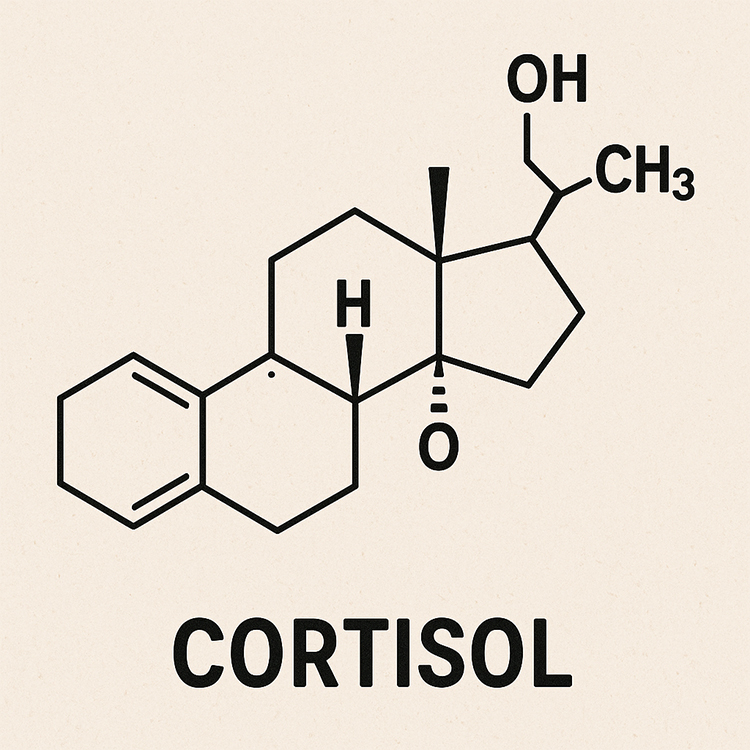
Wholistic Wednesday
What is Cortisol? What it Does.
Sometimes just a short on YouTube can start me down a wondering path. Such is the case when some fat-free guy started talking about cortisol on a short this morning. Here is what I found with the assistance of Artificial Intelligence (AI).
Cortisol is a steroid hormone, often referred to as the “stress hormone,” produced by the adrenal glands, which sit atop the kidneys
Here’s a breakdown of what cortisol is and its functions:
What it is:
- Steroid hormone: Cortisol belongs to a class of hormones called glucocorticoids, which are derived from cholesterol.
- Produced in the adrenal glands: Specifically, cortisol is synthesized and released by the zona fasciculata, the middle layer of the adrenal cortex.
- Regulated by the hypothalamus-pituitary-adrenal (HPA) axis: The production of cortisol is controlled by a complex feedback loop involving the hypothalamus and pituitary gland in the brain and the adrenal glands.
Functions of Cortisol:
Cortisol plays a vital role in many bodily functions, including:
- Stress response: Cortisol is released in response to stress, helping the body to mobilize energy, increase alertness, and prepare for a “fight-or-flight” situation.
- Glucose metabolism: Cortisol increases blood sugar levels (glucose) to provide energy during stress.
- Blood pressure regulation: Cortisol helps maintain normal blood pressure.
- Immune function: Cortisol can suppress inflammation and modulate the immune response.
- Metabolism: Cortisol influences the body’s use of fats, proteins, and carbohydrates.
- Circadian rhythm: Cortisol levels naturally fluctuate throughout the day, typically peaking in the morning and reaching their lowest point at night.
Cortisol and Stress:
- The “stress hormone”: Cortisol’s primary role in the body’s response to stress has led to its common association with the term “stress hormone”.
- Elevated cortisol during stress: During stressful situations, the HPA axis triggers the release of cortisol, preparing the body to cope with the perceived threat.
- Chronic stress and cortisol: Prolonged or chronic stress can lead to consistently elevated cortisol levels, which can have negative impacts on health if not managed.
In summary:
Cortisol is an essential hormone that helps the body manage stress and plays a crucial role in various physiological processes. While often linked to stress, cortisol is also vital for maintaining blood sugar, blood pressure, and immune function.
While no foods contain cortisol, certain foods can influence your body’s cortisol production, often leading to an increase in cortisol levels, according to OSF HealthCare.
Here are some food categories and specific examples that can trigger a rise in cortisol:
Foods That May Increase Cortisol:
- Refined Sugars and Processed Foods:
- These can cause rapid spikes in blood sugar, leading to increased cortisol production as your body tries to regulate blood glucose, according to OSF HealthCare.
- Examples: sugary drinks, candy, pastries, white bread, processed snacks.
- Caffeine:
- Caffeine stimulates the release of cortisol and other stress hormones, according to HCA Houston Healthcare.
- Examples: coffee, energy drinks, some teas, chocolate.
- Alcohol:
- Alcohol can disrupt cortisol levels and the body’s stress response.
- Examples: beer, wine, liquor.
- Excess Salt:
- High salt intake can lead to fluid retention and electrolyte imbalances, which can be perceived as a stressor by the body, leading to increased cortisol production.
- Foods High in Trans Fats:
- Trans fats can promote inflammation, which can indirectly contribute to increased cortisol levels.
- Examples: fried foods, some processed snacks.
Important Considerations:
- Moderation: It’s important to note that moderate consumption of some of these foods might not significantly impact cortisol levels for everyone.
- Individual Responses: People react differently to various foods.
- Overall Diet: A balanced and healthy diet, rich in whole foods, fruits, vegetables, and healthy fats, is generally recommended for managing stress and supporting healthy cortisol levels.
- Stress Management Techniques: In addition to diet, stress management techniques like exercise, adequate sleep, and relaxation practices are crucial for regulating cortisol.
Disclaimer: This information is for general knowledge and should not be taken as medical advice. If you’re concerned about your cortisol levels or stress, consult with a healthcare professional.
